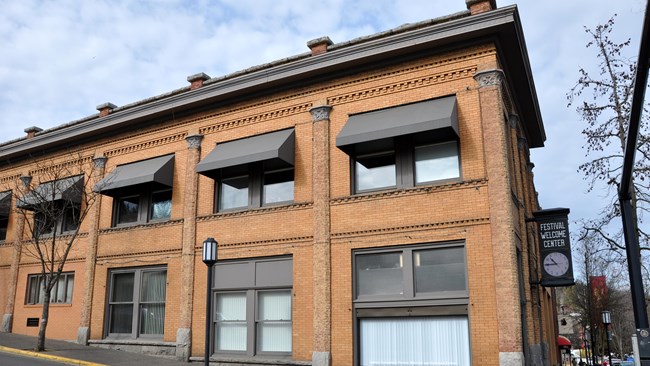Last updated: August 17, 2020
Article
All the World's A Stage: Ashland, OR

From its earliest days Ashland has always been a "hometown" community where those who came stayed to put down roots. Even today as a tourist center, visitors will remark on this "hometown" character and the warmth and friendliness of the townspeople. Ashland's women in particular were anxious to improve their town. The Ashland Women's Civic Improvement Club (now the Winburn Community Center) is a direct result of their activities, which included the acquisition of Lithia Park and the support of musical activities such as City Band concerts and Ballet in the Park during the summer months. These women, who earlier had established the Ashland Free Public Library, fought for and succeeded in obtaining funding for the Carnegie Library in 1912.
Alice Applegate Peil played a major role in promoting the arts in Ashland and working diligently to ensure success. At her home, the Peil House, a group of women, known as the Ashland Study Club, gathered to lay the foundations for a number of Ashland cultural attractions including the Oregon Shakespeare Festival.
While the women were interested in beautification and hospitality, many of Ashland's men were active promoters; as far back as 1914 Bert R. Greer, the editor of the Ashland Daily Tidings newspaper, put out a special issue entitled "Ashland, Oregon: the Carlsbad of America," (comparing the city to the famous Bohemian spa, located in today's Czech Republic). However, despite its reputation as a healing site, recognized by indigenous populations long before Europeans arrived here and began to promote "Lithia Water" as a nostrum, circumstances decreed that the town would not become famous as a spa. Rather it became a magnet for vacationers in search of the theater that developed here.
Ashland's emergence as a theatrical center really began in 1935 with the efforts of college instructor Angus Bowmer to convince the city to add Shakespeare's plays to its already celebrated Fourth of July festivities. With help from the Works Progress Administration, a simple Elizabethan stage modeled on Shakespeare's Globe Theatre was built inside the shell of the old Chatauqua arena. Here Bowmer and his college players would present The Merchant of Venice and Twelfth Night--a modest beginning that has burgeoned into a world-class repertory company.
Ashland has a long history of thriving religious congregations. Today, only Trinity Episcopal Church still serves the original denomination for which it was built. More typical of the adaptive nature of the town's historic preservation is the First Baptist Church which, like Ashland itself, has been reinvented to serve theatrical and tourist needs. Those residents and visitors seeking lighter theatrical fare than that provided by the Oregon Shakespeare Festival (OSF) flock to the old First Baptist Church, now known as the Oregon Cabaret Theatre. This is only one of many community theaters that complement the OSF professional productions and that perform year-round.
The First National Bank Building, which houses the Festival's Welcome and Education Center, is another example of an historic building's adaptation to contemporary use. The Welcome Center has daily schedules informing patrons of OSF shows and events, interactive stations that provide access to the OSF web site, and archival information and video footage about OSF. Maps, brochures, and other printed information also are available. OSF company members and volunteers staff the center. The Education Center provides much-needed space for student workshops, classes and discussions. OSF serves hundreds of student groups each season introducing young audiences to live theater.
In Ashland, the Shakespeare stage has drawn amateur and community theater groups; an abundance of classical, folk, and jazz musicians; and many painters and sculptors. So Ashland itself has become a cultural stage where residents and visitors alike enjoy these diverse presentations against the backdrop of a town whose commitment to historic preservation has made it uniquely viable today.
Discover more Oregon history by visiting the Ashland, OR travel itinerary.
